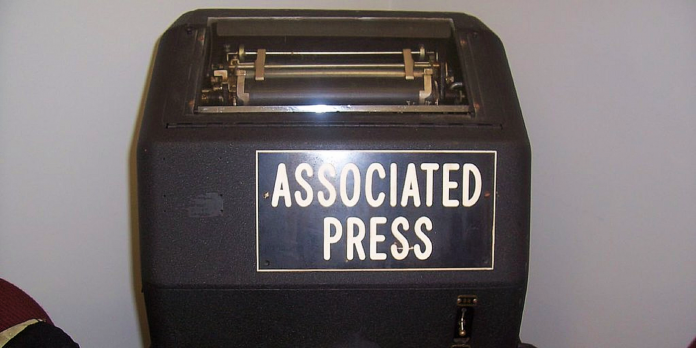(Headline USA) The Associated Press—oft known for its capricious and nonsensical style rules, which try to use subtle virtue-signaling to steer a national media narrative—has just taken a major plunge off the deep-end.
In the wake of recent race riots, the AP declared last month that it would begin capitalizing the word black in racial and cultural references.
But the left-skewed news agency is now insisting, bizarrely, that it plans to keep white references lowercase.
This decision follows our move last month to capitalize Black in such uses. We consulted with a wide group of people internally and externally around the globe and considered a variety of commentary in making these decisions. (2/8)
— APStylebook (@APStylebook) July 20, 2020
Appropriately, the overt racism expressed in its latest style tweak seems to bring it back full-circle, in a way, to a not-so-bygone rule on race many deemed uncomfortable and offensive.
For well into the 2000s, the AP Stylebook insisted on using lowercase black in all cases, even as the term African American grew to be a more commonly accepted and politically correct racial identifier.
In both cases, the presumption was that the style rule was in place to add further clarity or precision, but each effectively achieved the total opposite: more confusion and inconsistency.
The idea behind using the lowercase black was that not all those who were considered “black” identified as African American since some may have hailed from the Caribbean or been purely of African descent.
In the latter decision, to capitalize the word, the AP claimed it aimed to acknowledge a special cultural distinction that black connotes when used in racial context.
There was clear desire and reason to capitalize Black. Most notably, people who are Black have strong historical and cultural commonalities, even if they are from different parts of the world and even if they now live in different parts of the world. (3/8)
— APStylebook (@APStylebook) July 20, 2020
But the move itself seemed to many to be a gesture of privilege as the paper deigned to cast an overly broad net by characterizing all blacks as being the same culturally.
Democrat presidential hopeful Joe Biden caught criticism in May for doing something similar when he declared that any voter who could not decide between him and incumbent President Donald Trump “ain’t black.”
Meanwhile, in reaching the opposite conclusion for white, the AP said, inaccurately, that white people in general have much less shared history and culture, and don’t have the experience of being discriminated against because of skin color.
The declaration was immediately denounced by Twitter users and others.
This is actual racism.
— Latin X (@RealLatinX) July 20, 2020
The AP itself acknowledged that the decision to continue using a lowercase white was “more ticklish” than its decision to use an uppercase black.
On one hand, it noted that even some black advocacy groups saw the disparity as being racist. The National Association of Black Journalists and some Black scholars have said white should be capitalized, too.
“We agree that white people’s skin color plays into systemic inequalities and injustices, and we want our journalism to robustly explore these problems,” John Daniszewski, the AP’s vice president for standards, said in a memo to staff Monday. “But capitalizing the term white, as is done by white supremacists, risks subtly conveying legitimacy to such beliefs.”
It validated its racially motivated decision, much as many racists in the past have done, by noting that other “respected” similarly racist outlets had followed suit, a phenomenon that was once referred to as “lynch mob” mentality.
Columbia Journalism Review, the Wall Street Journal, New York Times, USA Today, the Los Angeles Times, NBC News and Chicago Tribune are among the organizations that have recently said they would capitalize “black” but have not done so for “white.”
“White doesn’t represent a shared culture and history in the way Black [sic] does,” The New York Times said on July 5 in explaining its decision.
CNN, Fox News and the San Diego Union-Tribune said they will give white the uppercase, noting it was consistent with Black, Asian, Latino and other ethnic groups. Fox cited NABJ’s advice.
CBS News said it would capitalize white, although not when referring to white supremacists, white nationalists or white privilege.
Some proponents believe that keeping white lowercase is actually anti-black, saying it perpetuates the idea that whites are the default race.
“Whiteness remains invisible, and as is the case with all power structures, its invisibility does crucial work to maintain its power,” wrote Eve Ewing, a sociologist of race and education at the University of Chicago who said she’s changed her mind on the issue over the past two years.
“In maintaining the pretense of its invisibility, whiteness maintains the pretense of its inevitability, and its innocence,” she wrote on the website Nora.
Kwame Anthony Appiah, a philosophy professor at New York University, wrote in the Atlantic that capitalizing white would take power away from racists, since their similar use “would no longer be a provocative defiance of the norm.”
“We will closely watch how usage and thought evolves, and will periodically review our decision,” Daniszewski said.
Editor’s note: Headline USA will retain the original style of keeping both races lowercase, even in stories by the Associated Press.
HUSA has not decided whether it will retain the prior capitalization in its references to the AP or other news organizations whose use of the absurd race-baiting rule have further invalidated their own standing as objective journalism institutions of any substance or consequence.
Adapted from reporting by the Associated Press

